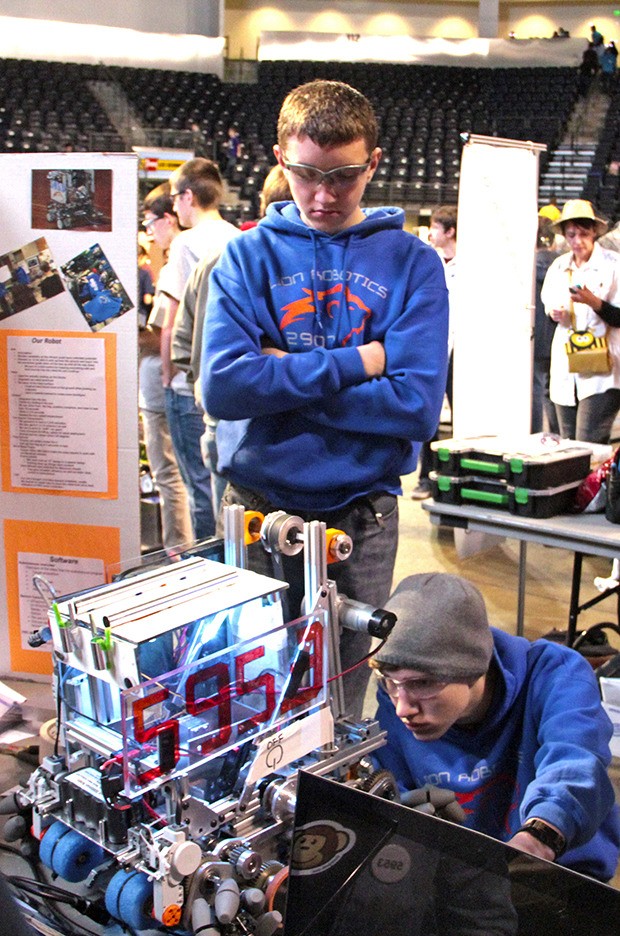Inside, it’s a nerd’s paradise.
Hundreds of students gather around scores of tables, all loaded with machine parts for the robots built to take home the coveted Washington FIRST Tech Challenge (FTC) title at Kent’s ShoWare Center.
In the middle of the pits, a practice area allows the teams to finish fine-tuning the 18-inch-by-18-inch robots, preparing them to compete in Cascade Effect, this year’s challenge.
Wendy Liang, an 18-year-old Hazen senior and co-founder of Hazen 9693 Team Scarab, explained the rules.
“Each squad consists of a group of seventh- to 12th-graders,” she said. “The field is 15 foot by 15 foot, split in half with red and blue sides.”
On each side an alliance of three teams operates its robots in cooperation with the others.
“There are three parts,” Liang said. “The first is autonomous for 30 seconds. The robots do what they’re programmed to.”
After the autonomous section, the teams take control by remote, operating their robots as they try to scoop up two different-sized balls and put them into three different-sized plastic tubes.
“Points are scored not on how many balls you have, but how high the balls are in the tubes,” Liang said.
The final 30-second section allows teams to score extra points by attempting to load balls into the center goal tubes, which are the highest in the field.
Also on hand at the competition is Auburn Mountainview’s Roarbotics Team 5953, headed by co-captains Jasper Lommen and Austin Kukay.
“FIRST is known as the sport for the mind, which is how the founder puts it,” Lommen said. “People can get together and build robots. There is a lot to it. There are business management skills, there are mechanical skills, and there are a lot of teamwork skills you get.”
Lommen said he got started in FIRST when he was in middle school.
“I saw a robotics program was starting at Rainier (Middle School),” he said. “I thought it sounded really cool and I wanted to get involved with that. It’s helped develop my skills as a programmer and as a leader. I have contacts in the community, and I can contact them and talk to them professionally. It basically taught me how to run a business.”
Lommen said Roarbotics meets every day after school until 5 p.m.
“At least 15 hours a week,” he said. “It’s that rewarding. We all have a place on the team, and it’s more intimate than sports are. You can learn, you can do what you want, and you don’t have coaches yelling at you.”
Lommen added that the robotics programs are currently the biggest program at Auburn Mountainview.
“It’s bigger than football, than basketball, than all that,” he said.
Auburn Mountainview has recently named the program an official sports at the school, hanging a banner in the gym alongside other more traditional sports.
At this past Saturday’s competition, Roarbotics earned the Rockwell Collins Innovate Award and punched its ticket to the FTC West Super-Regional Championship on March 27-29 at the Oakland Convention Center in Oakland, Calif.
Also moving on is Auburn’s 7364 Mindbot Maniacs team, which participated in the finals as part of an alliance.
For Team Scarab from Hazen, the results weren’t as good, but that’s not why they’re there anyway.
“Our team just started this year. We’re a rookie team,” she said. “The last two years we were preparing for the competition with Labview and learning how to build with simple robots from the manual.”
“I do it because ever since I was really little I was interested in this STEM field in general,” she said. “In my sophomore year I took AP computer science, learned how to program and become very interested in computer programming.”
Liang said she hopes to build on the things learned with FIRST by majoring in mechanical engineering at the University of Washington.
ALSO: The ShoWare also hosted the Washington State FIRST LEGO League (FLL) Competition Western Washington championships. Sammamish’s Astroboats Team 3368 took home the state title, with Renton’s Lord of the Gears Team 4988 winning the Core Values: Teamwork award. The FLL pits teams of three to 10 competitors, aged 9 to 14 with two adult coaches or mentors, against each other in a robotic competition. Teams build and program a small robot to accomplish various challenges, as well as investigate a research topic and present findings at tournaments. Teams also win points by establishing a team around FLL Core Values, which emphasize sportsmanship, learning and community involvement.


